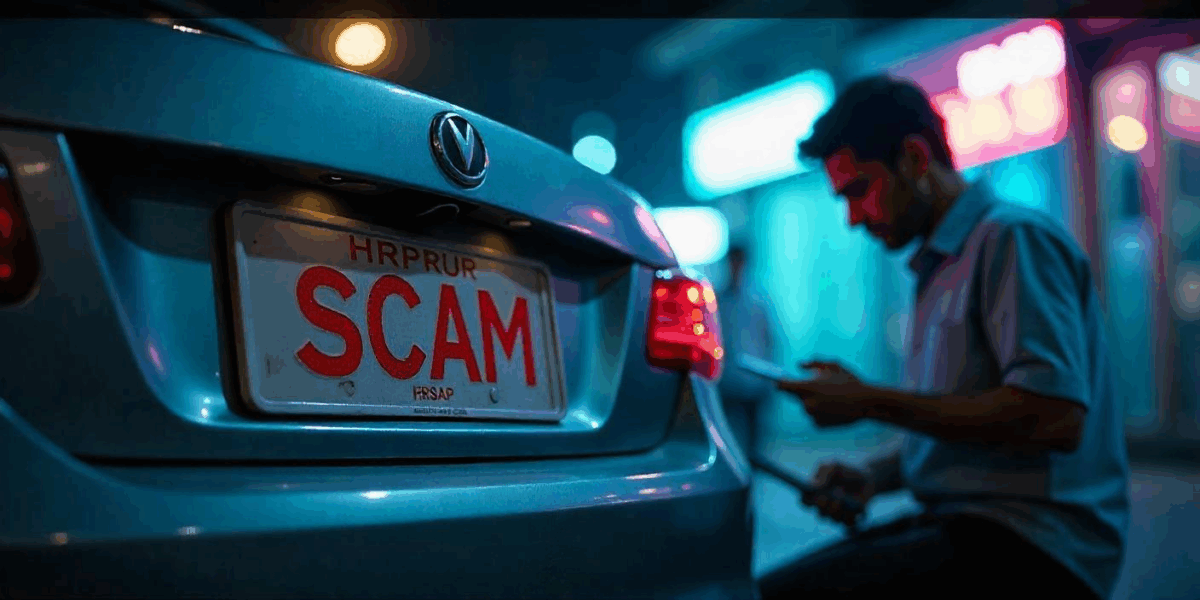Do you know that feeling when you’re just trying to follow the rules and still get scammed?
That’s exactly what happened to thousands of vehicle owners recently, including a Bengaluru man who lost ₹96,000, all because he tried to book a High-Security Registration Plate (HSRP) online.
Let me break down how it went down.
It All Started With a Reminder
Vijith Kumar, a 57-year-old from Bengaluru, received a message like many of us did:
“Install your HSRP before the deadline or pay a fine.”
Simple enough. He thought, “Okay, let me get this done today before I forget.”
So he did what most of us would do. Opened his phone, Googled how to book an HSRP, and clicked on the first website that looked legit.
The page looked neat, even had a logo, and asked for basic details, car number, phone, email, and payment.
Everything seemed normal.
“Your Parcel Couldn’t Be Delivered”
A few days later, he got an SMS that looked like it was from India Post. “Your HSRP delivery failed. Please update your address to receive your plate.”
He clicked the link. It asked for more details. Again, it all looked official.
What didn’t he know? That single click would cost him nearly a lakh.
Within minutes of submitting his details, he got two alerts from his bank. One said ₹48,000 was debited. The other said the same.
He froze. “Wait… What? I didn’t make any payments just now.”
But the damage was done.
The Scam Was Bigger Than It Looked
Turns out, he wasn’t alone. Dozens of vehicle owners across Maharashtra and other states got fooled by similar fake HSRP websites.
These sites were cleverly designed to look just like the official government ones. They’d grab your attention through WhatsApp forwards, SMS links, or pop-up ads.
The Maharashtra Transport Department ended up filing an official complaint with the Mumbai Cyber Police.
When the investigation kicked off, the police found at least six fake HSRP portals. The person behind one of the biggest ones? A 57-year-old from Bengaluru was finally arrested for running the scam.
How Did So Many People Fall For It?
Simple answer: It felt real.
The websites asked for details that seemed normal. They didn’t immediately ask for huge sums.
Many victims say they were charged small booking fees first, ₹400 or ₹500, so they assumed all was well. Then came the fake delivery issues, and that’s when the phishing links started appearing.
It’s that moment of “let me quickly fix this” that these scammers wait for.
So, What Should You Do?
The Transport Department has made it clear:
Only use the official websites for HSRP booking. In Maharashtra, the government portal lists all approved vendors like Rosmerta, Real Mazon, and FTA Solutions.
If you’re in another state, always double-check with the RTO’s official website.
Also, if you get any link from an unknown number, don’t click. Seriously.
And always remember, India Post isn’t going to ask you to update your address through random SMS links.
One Final Word
Scams like these don’t just steal money—they shake trust. Vijith didn’t do anything reckless. He didn’t share his OTP with anyone. He just didn’t know the site was fake.
If this story feels close to home, take a moment to check the links you click. And maybe, let your parents or less tech-savvy friends know too, because these scams are getting smarter.
Stay alert. Stay safe. And don’t trust every “official-looking” website out there.







